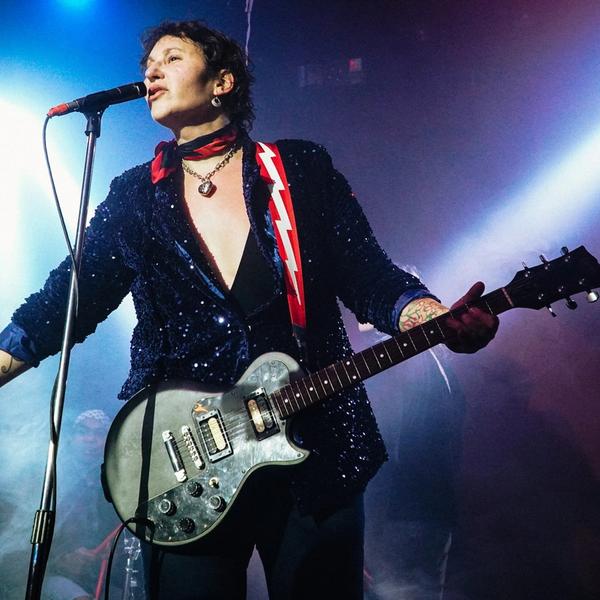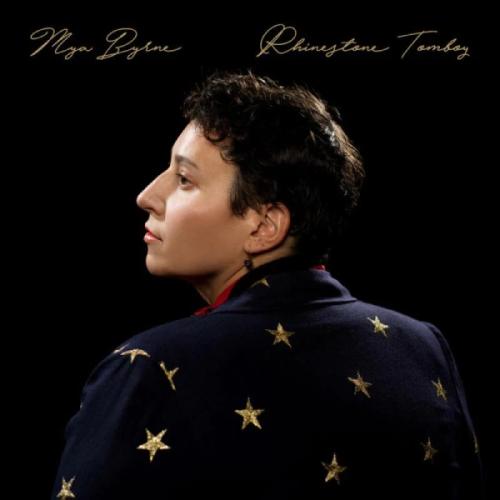




Link copied

Mya Byrne is sitting on her couch surrounded by a tangle of numerous instrument cases and guitars, her tranquil mid-afternoon Brooklyn neighbourhood passing by outside the window.
She’s feeling chilled and is keen to talk to Holler about pretty much everything – and there’s a lot to cover, from her pushing the Americana envelope in exciting new directions to being a proud, queer trans woman in the genre’s community. There’s also ‘Burn This Statehouse Down’, her newly released powerful protest song with Paisley Fields written against draconian new anti-LGBTQIA+ legislation.
But the main talking points is her new, Aaron Lee Tasjan-produced album Rhinestone Tomboy, via Kill Rock Stars Nashville (marking the first release of the legendary indie label’s brand-new imprint). Steeped with potent branches of blues, rock, glam and country, it’s a12-song journey into redemption, as she gives life to stories of joy and challenge.
Mya Byrne is every bit the outsider the genre was built upon - and there’s certainly no holding her back.
How would you describe your music to someone unfamiliar with your work?
I would describe it as if Waylon Jennings, Johnny Cash and Lucinda Williams all had a very, very queer lesbian child!
How about your playing style?
I’d call it loose and precise. I’m really influenced by Bob Dylan’s live performance. I come from a world of improvisational music, so there’s a lot of jazz and free-form stuff, very blues-rooted.
Did you have musicians in the family?
Well, my father is a rabbi. We grew up singing all the time; that was our thing. My grandmother and my great aunt sang in the Yiddish theatre. And I always had a song in my bones.
Tell me how you hooked up with Aaron Lee Tasjan?
We became friends around 2007. I wouldn’t say we were like friendly rivals, but I think a history book might! Everybody was just in the scene, Thursday nights at 10pm at Rockwood Music Hall, in New York. We all had that slot a few times a month and invited each other to play in our shows.
How did he become your producer?
We stayed in touch for years, and I’d seen him work his magic when he moved to Nashville. I sort of lost touch after he started playing with the New York Dolls in 2010, but when I transitioned he sent me some very sweet messages and we started rekindling our friendship. We strongly reconnected when the pandemic happened, and I started coming to Nashville and working more directly in queer country music.
Then he came out when he did Tasjan Tasjan Tasjan. I told him I was so proud of him and he said something to the extent of, “Thank you for modelling coming out professionally”. I was very touched. I knew I had a record in me and wanted to make it in Nashville. I wanted to do something out of my comfort zone, but also be comfortable doing it. So I called up Aaron, and he said, “I don’t produce artists; that’s not my thing. But I will work with you, because you’re my friend and I love you”.
What does he uniquely bring to this album?
He brought what Bob Johnston did with Leonard Cohen and Bob Dylan on those seminal records: players that really cared and wanted to do something outside their own box. We have a lot of the same influences. I was good at playing Americana and roots music, and having him come in, he gets to shine as a country guitar player, and I get to shine on my more glam rock, David Bowie side.
Tell us a bit about how you write your songs – like ‘Smoke and Bones’.
That was written a day or two after the fires died down in Northern California in 2018. They threw me and my friends for weeks; we literally couldn’t leave the house without checking the air quality. I also lived in New York City during 9/11, though I wasn’t in the city that day, but you could smell death. Everywhere you went there was ash and I felt I was treading inside humanity.
Coming from a religious background, that song to me is an incantation, like I’m calling to the sky; here’s the frailty of man, the story I’m telling my grandchildren of the fire in 25, 30 years. And that’s how it flowed out. It was titled ‘The Song of Smoke and Bones’ originally and was pretty much a tone poem. I just sat at my piano, played a drone note and that melody came out.
And ‘Curtains’?
That’s my favourite song on the record. I’m a light-sensitive person and during the depths of the lockdown I had to have blackout curtains the whole time. I was stuck in my place in Berkeley, which is very beautiful. It was ironic - all of this beauty all around me, houses that had survived the creepiest pandemic, seeing the sky so clear and being able to breathe because there was no car pollution, yet all of these people are dying and there are morgues set up in the alleyway next to my best friend’s house in New York.
I wrote that song at peak Covid, I was just so frightened. The lyrics are a metaphor for a lot of things. It was springtime and 80° outside and at night the walls were freezing. I couldn’t go anywhere or do anything, I couldn’t touch any of my lovers or see anyone I adored. I was so touch-starved for so long, like so many of us. I listen to that song and I can’t believe I wrote it.
The album’s opener ‘It Don’t Fade’ features the first nationally broadcast kiss between two trans lesbians in its video. What was the inspiration behind the song and how did the video idea come about?
I have a very specific writing practice, in which I write a song a day per week, with about 20 or 30 other songwriters, to a prompt. That prompt was an Edward Hopper painting called ‘Girl at Sewing Machine’, and it’s apparently his definitive riff on solitude.
In that song I’m also thinking about my grandmother and great aunt who came to this country from Lithuania. The girl at the sewing machine is obviously in New York in the 1920s. I started thinking about my great aunt specifically - she left the Yiddish theatre because there were people there who treated her like shit. And women specifically got into doing piece-work, where they had a sense of autonomy. That’s what the last verse is about. We have the ability to pull abundance from ourselves.
When the time came to make a video, I said I want to walk down the street in Berkeley, California where I wrote that song and capture a feeling. It happened to be a beautiful day and everything was glorious, like it looks when the fall colours are up. I think we really captured something.
Tell us more about your new song ‘Burn This Statehouse Down’ with Paisley Fields.
Paisley and I had been working together for a long time and the day before our writing session was when the HB1 and HB3 (anti-trans and anti-drag laws) passed the Tennessee State Legislature. We said, “We need to get this out right away”. We were just so angry, and when the two of us write together, these songs are the edgiest and the things we’d normally self-censor. Surprisingly it’s been getting a lot of airplay in Europe, I get reports from Apple that people have been Shazamming it in Oslo.
How does being a role model constrain, but also empower you?
For me specifically it’s really important, especially in terms of being trans, and being a woman, and being a butch woman, and being a lesbian; we do tend to get pigeonholed. I hold all these multiple marginalisations – and I’m Jewish! It’s all of these things that I have to hold and stand in front of, and there are days when I wish I could disappear into the woodwork, but I can’t.
It’s not that I set out to be a role model, but I think it’s important. I get emails from people who didn’t know there were people like me, saying they didn’t know they were allowed to do this. It’s meaningful and giving, but before I hooked up with a record label, in my own personal marketing I’d say: being trans is not my defining characteristic; I’m a hell of a songwriter and a damn good cook too!
Have you had many setbacks on your journey as a trans woman and musician?
Yeah. When I came out in 2014 I lost a lot of work. I’m grateful for those who understand what my music is about and who I am as a writer and performer. It’s not about my identity, but at the same time it informs a huge part of that, and it’s been difficult. I’d love for a tour to happen, but I’ve been rejected by tons of bookers and major festivals who’ve literally all said, “We can’t really find a place for you to fit in here”.
Is there a turning point in your career when things fell into place?
The big defining moment for me was discovering that I had so many people in my life who cared about me and what I was doing. When I went to Nashville in May 2021 the whole city opened up to me – and meeting my partner, who has been such a font of support, the two of us pushing each other to do more things.
Do you find Americana a more welcoming place for LGBTQ+ people than other genres?
I believe we have to transcend genres. They’re important for selling records, but Elton John is Americana. This all started with Elton and Bernie – and the Band. It’s become a welcoming place for LGBTQ artists. But at the same time, I’ve seen other artists wanting to come out but being told they’ll be pushed into a very specific lane. I see that with a lot of artists; they don’t think they have a place in this music and are actively discouraged. One of the reasons I push so hard is because I don’t like that.
Did you choose Americana or Americana choose you?
I think I stumbled into it because Americana is folk music, country music, it’s the songs of the people. At the end of the day I’m a storyteller, and that’s the story I want to tell: how I walk through this world. And Americana is everything that encompasses American music and beyond.
Are ambition and goals important?
I do set goals in a general sense. I want to create a better world. When you’re trans and queer it’s hard to sit and have a five-year plan; I’ve never made one. But I’m an incredibly ambitious person if there’s a thing I see a need for – like trying to get younger trans and queer kids instruments.
Who have been your cheerleaders and allies?
A big turning point was September 2021 when all these people who’d got together in the pandemic finally met in person and played together and hugged for the first time in Nashville, at a showcase at Vinyl Tap in the Americana Fest. Many journalists, radio hosts and other musicians are rooting for me. At the same time friends and lovers say: you are good enough and you belong here. People literally open up their homes to me. I feel very lucky and blessed that on my worst days I can call up a friend and say: tell me I’m pretty and tell me I’m good! And they will.
On each listen of this record, you further grasp the breadth of Mya Byrne’s ambition and her songwriting prowess, with that crucial added ingredient of the perfect producer.






